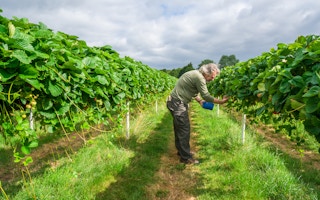When the coronavirus pandemic shut his restaurant German chef Patrick Mayer swapped his kitchen knives for farm tools and now spends his days harvesting asparagus – work normally done by seasonal labourers from Romania.
From Italy to Britain, travel bans to curb the spread of COVID-19 have left farms across western Europe short of hundreds of thousands of migrant workers, raising fears that crops could end up rotting in the fields.
France and Germany have already launched job-matching schemes, appealing for people who have lost work during the pandemic to plug the gap. Britain is expected to announce a similar “Pick for Britain” campaign shortly.
Spain, a major fruit and vegetable exporter, has meanwhile said it will allow illegal immigrants to take farm jobs alongside the unemployed - an idea also being aired in Italy amid fears the mafia could exploit the crisis.
The labour shortage is an immediate headache for farmers in Germany where April marks Spargelzeit – asparagus time – a crop that is not only prized as a national delicacy, but also celebrated for heralding in the spring.
Germany is the world’s fourth biggest asparagus producer, growing about 130,000 tonnes a year.
The “Spargelfest” (asparagus party) is an annual highlight in many places when communities gather to savour the slender white vegetable, sometimes referred to as “edible ivory”.
After closing its borders on March 25, Germany announced this month that it would relax restrictions to allow in around 80,000 seasonal workers in April and May.
It also launched a website to find 20,000 locals, targeting the unemployed, those temporarily laid off, students and asylum-seekers.
“I placed my ad one evening and the following day my mobile wouldn’t stop ringing,” said Simon Moser, who runs a farm in Lauffen am Neckar in southwest Germany.
His new recruits include Mayer, who said the gruelling work nearly killed him in the first week.
“This job is definitely different to what I usually do,” he told the Thomson Reuters Foundation.
“With cooking, it’s more about using the head, but with agriculture it’s more about the body, which is exhausted and broken by the end of the day.”
The work has given him a new respect for Germany’s migrant workforce, who mostly come from Poland, Bulgaria, Romania and Hungary and earn the minimum wage of 9.35 euros ($10.26) an hour.
“I tip my hat to them because what they achieve, not one German would want to do,” Mayer said.
“I look at Germany very critically now - that we’re unable to pick our own produce from the soil because we’re too lazy.”
Mafia fears
In Italy, farmers’ association Coldiretti estimates labour shortages have left more than a quarter of produce at risk, including wine and oil.
Italy normally depends on 370,000 labourers from countries including Romania, Morocco, India, Albania and Senegal.
“These are perishable products that must be picked at the right time, otherwise they rot in the field. These operations cannot be postponed,” Coldiretti’s president Ettore Prandini said.
With the first fruit harvests imminent, Coldiretti has launched an online platform to match job-seekers to local farms.
Many of those signing up in the northern Veneto region normally work in the tourism industry which has been hammered by the global lockdown.
One fruit farmer in Emilia-Romagna said he thought the crisis could lead to a positive long-term change in attitudes towards working in agriculture.
But farmers say Italy will not be able to make up the shortfall locally and must also open a “green corridor” to allow in workers from eastern Europe. Coldiretti said the government was already in talks with Romania.
Agriculture minister Teresa Bellanova has also suggested Italy should regularise hundreds of thousands of undocumented migrants in the country so they can help on the land and to prevent their exploitation by the mafia.
Spain, which needs to find 300,000 seasonal workers, is the only country so far to embrace illegal migrants as part of the solution.
It has also said the unemployed will continue receiving state benefits while working as fruit pickers.
The measures will remain in place for nearly three months to guarantee food supplies and give an income to those most in need amid spiralling unemployment.
‘Unchartered territory’
In France, agriculture minister Didier Guillaume has called on out-of-work hotel staff, waiters, hairdressers and others to join “the great army of French agriculture” to replace 200,000 seasonal workers.
An online platform called “Des bras pour ton assiette” (Arms for your plate) has already received more than 210,000 applications for jobs including harvesting, packing and deliveries.
Even pensioners have expressed an interest, but they cannot leave their homes because of their heightened vulnerability to the virus.
In Britain, which needs about 70,000 seasonal workers, several agriculture organisations have launched job-matching schemes which will continue in tandem with the expected national initiative.
The government has said furloughed workers - who continue to receive 80% of their salary - can also take agricultural jobs.
Farmers said they had already been inundated with requests, but the situation needed careful managing.
They fear that when the lockdown is eased people will return to their old jobs, leaving them in the lurch and harvests spoiling in the fields. If this happens it could lead to produce shortages in the shops.
“There has been a terrific interest in picking up these jobs, but we’re in unchartered territory here,” said Jack Ward, CEO of the British Growers Association.
“What happens in the fields will determine how much food is available for the great British public, so it’s hugely important we get this right.”
This story was published with permission from Thomson Reuters Foundation, the charitable arm of Thomson Reuters, that covers humanitarian news, climate change, resilience, women’s rights, trafficking and property rights. Visit http://news.trust.org/climate.










